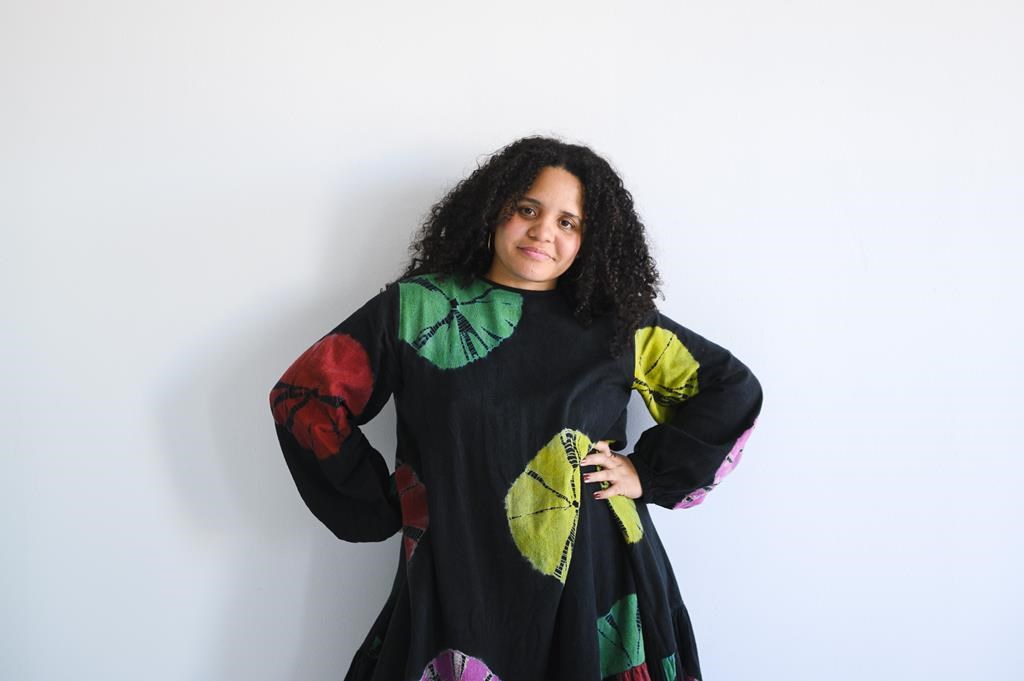TORONTO — Lido Pimienta isn’t a fan of the word humble. There’s a kind of twisted history, she says, behind the term.
“Being humble is a word that is rooted in humiliation,” says the multidisciplinary artist, known for her Polaris Prize-winning album, “La Papessa” and its critically acclaimed followup, “Miss Colombia.”
“When someone tells you to go back to your country as many times as they’ve told me, there are two choices, you either humble yourself or you empower yourself,” Pimienta, who identifies as Afro/Indigenous/Colombian/Canadian, adds during an interview ahead of the show’s premiere. She links the term to the way Indigenous Peoples were colonized and wrongly persuaded to submit.
“I believe in being respectful and self-aware, but when I’m good at something, there’s no reason for me to be humble about it.”
Pimienta’s new variety show, “Lido TV” is equally un-humble and unapologetic in form and function. The CBC Gem series, set to premiere on the streaming platform on Friday, is a vibrant satirization of children’s edutainment from years past. It usescomedic delivery to address difficult-to-discuss subjects—colonialism, hate, beauty, and feminism to name a few.
“I like to use humour to portray these ideas because a lot of what racialized people have to go through is not funny at all,” says Pimienta. “It’s been such a useful tool to remain in control of my life.”
Created, hosted, produced and co-written by the artist herself, the show features a mainstay of Canadian talent, including musicians Shad, Halluci Nation, and Nelly Furtado. Each episode blends documentary-style chunks of information from Pimienta’s birthplace of Barranquilla, Colombia with sketches. It was a project that Pimienta says startedduring the pandemic.
For what it may lack in subtlety, it compensates with a clear-sighted commitment to allow for loaded subjects to feel digestible. The humour, as the French-Canadian director of “Lido TV” Maya Annik Bedward, would put it, serves as much as a genre choice as it is an outright lure.
“As a racialized filmmaker, the topics we deal with are often serious and it’s a lot,” says Bedward. “The goal for us has been to bring out the humour of a puppet flower in a way that’s been so fun, liberating and energizing through this way,” she says,referring to the way Pimienta exchanges thoughts with a hand puppet in the form of a flower throughout the series.
Bedward has developed a reputation as a filmmaker whose work explores themes around resistance, community and family. Her most recent short film, “Why We Fight” streaming on CBC Gem, is about a couple who finds strength in the Brazilian martial arts form known as Capoeira, as they raise their son Nauê who lives with a life-threatening condition. Her short film “The Foreigner” follows an outsider seeking a sense of community and acceptance.
Bedward found the process of creating”Lido TV” to be personally enlightening.
“For me, it was a huge ‘ah-ha’ moment, where I just realized how much I love working in comedy and how much it fills my soul,” says Bedward. “It was an amazing sandbox to play in.”
Several sketch ideas were fleshed out by co-writers Sarah Hagi, who is Black and Muslim along with Tim Fontaine, who is Anishinaabe. In one “Lido TV” episode, white people are presented on a reality TV show through a land acknowledgment contest with the prize being the return of landto Indigenous people. In another, a vampire comes to grips with the way shifting beauty standards have impacted his ability to do his neck-biting job.
Like Pimienta, the team embraces humour in a way that can also be culturally specific. In the case of Bedward, she says that the exchange of taunts and jokes stood as a historical means of camaraderie-like communication in Jamaica, while Leto’s Colombian heritage formed similar bridges. It’s how she’s learned not to take herself too seriously in spite of the subject matter.
“We will be the first ones to clock ourselves if we were being too patronizing, preachy because patronization is boring,” says Pimienta. “It’s why in so many of the sketches, I make fun of myself because we’ve never wanted to fall within that high moral ground trap.”
Lido is confident in herself and her latest form of self-expression. In various ways, much like “Lido TV,” she relays the fullness of who she is through stories about self-image and social issues that she says remained inside of her for far too long. She’s completely aware of where she expects this new outlet of hers to go — not just a hope, but a certainty.
“I hope there are online fights and I want Fox News to be offended by it, but I also want happiness and deep conversation,” says Pimienta. “I also want Indigenous people to watch it and be happy with it. The majority of people are gonna love it. I already know that.”
This report by The Canadian Press was first published Sept. 20, 2022.



